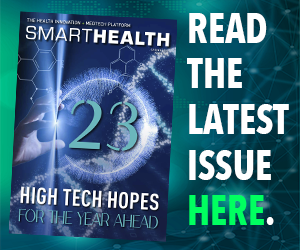Georgina Lupu-Florian is the founder and CEO of Wolfpack Digital, an award-winning full-service web and mobile app development company based in Romania, with a team of over 70 people. The company has a rich portfolio of health apps and medtech is one of its core industries. Wolfpack Digital has just announced it will open its first overseas office in Dublin. Lupu-Florian is also co-founder of Pamble, a mental health start-up with a mission to treat gambling addiction. On her days off, she loves spending time with her cats, friends and family, running and reading cosy mystery stories.
How does health innovation surprise you?
I’d say the mental health flavour of it. Healthcare is now seen through a much more holistic lens, focusing on keeping healthy or managing illness from multiple perspectives, as opposed to being targeted on a specific aspect of recovering from disease. There are apps that help patients monitor and improve their emotional, physical, spiritual, and mental wellbeing. Still, with the increasing number of healthtech apps out there, people may well run into an informational overload — having so many apps to choose from that they can’t easily find the right solution for their needs.
What tech has made the greatest impact?
Diagnosis based on AI is disrupting medicine for sure, and smart (IoT) medical devices are here to change our world, because they can provide improved, non-biased diagnosis capabilities. Telemedicine apps and any software in general that connects patients and doctors or pharmacists remotely have had a massive impact during the pandemic. While all telemedicine apps work on a similar principle, their increasing number has resulted in specialised services for many niche needs or problems a patient could be facing. The evolution of the regulatory context for it has certainly made a difference. Developing health apps comes with its own challenges, such as ensuring excellent security for sensitive patient data and international standard compliance.
Who is impressing you right now?
The pandemic has strongly affected the healthcare space, and a major need to connect doctors and patients evolved into finding and implementing accessible solutions. Healthcare companies and entrepreneurs saw this as an opportunity and started partnerships with tech companies to develop digital products, especially custom solutions. We have seen a lot of interest in the mental health space too. Healthtech startup BrainCapture for bringing low-cost EEG solutions to low-income countries, and .lumen (DotLumen) for creating the first glasses empowering the blind.
What transformations are yet to be explored?
One subject sure to see more attention in the future is medical software that doesn’t require any extra hardware, serving its purpose with just a phone or tablet (Software as a Medical Device). The chip shortage we’re facing will no doubt cause problems for health tech companies but these hardships will likely also lead to impressive innovation and progress. One way in which digital solutions have always disrupted the status quo is by achieving a great deal with little resources, and I don’t see why health tech will be any different.
Fast forward five years >>>
We’ll see an increased focus on refining those ideas and adapting products to specific patient needs. As the industry grows, more and more companies are starting to see the benefits of multidisciplinary teams working together to create life-changing solutions. Truly exceptional apps often require both experienced developers and guidance from medical professionals, plus a keen eye for business. So, I expect this to become the norm in the future.

![Georgina Lupu-Florian Wolfpack Digital[13601]](https://smarthealthnetwork.ie/wp-content/uploads/2022/03/Georgina-Lupu-Florian-Wolfpack-Digital13601-scaled.jpg)




